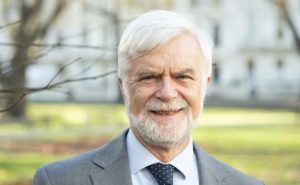Jim Skea of the United Kingdom is the newly elected Chair of the Intergovernmental Panel on Climate Change (IPCC).

Skea, 69, was elected on Wednesday, July 26, 2023, by 90 votes to 69 in a run-off with Brazillian Thelma Krug, a vice-chair of the IPCC.
He replaces South Korean Hoesung Lee, 77, who has been IPCC chair since February 2015.
With nearly 40 years of climate science experience and expertise, Jim Skea, a IPCC co-chair, will lead the IPCC through its seventh assessment cycle.
“Climate change is an existential threat to our planet. My ambition is to lead an IPCC that is truly representative and inclusive, an IPCC looking to the future while exploiting the opportunities that we have in the present. An IPCC where everyone feels valued and heard,” said Skea in his address to the delegates attending the IPCC elections.
“In this, I will pursue three priorities – improving inclusiveness and diversity, shielding scientific integrity and policy relevance of IPCC assessment reports, and making the effective use of the best available science on climate change. My actions as the Chair of the IPCC will ensure that these ambitions are realised.”
The election took place at the headquarters of the United Nations Environment Programme (UNEP) in Nairobi, Kenya, where the IPCC is holding its 59th Session. Elections for other positions in the IPCC Bureau, including the Co-Chairs of the IPCC Working Groups, will take place from July 26 to 28.
Four candidates ran for the Chair of the IPCC. Apart from Skea and Krug, others were Belgian and former IPCC vice-chair, Jean-Pascal van Ypersele; and South African and IPCC co-chair, Debra C. Roberts. These were the first elections in the history of the IPCC with women candidates running for this position.
Skea is Professor of Sustainable Energy at Imperial College in London. During the IPCC’s just completed sixth assessment cycle, Skea was the Co-Chair of Working Group III, assessing the mitigation of climate change. Most of his career, spreading over decades, has been dedicated to ensuring that the challenges of climate change are understood, and actions to avert them are taken.
The election of the new IPCC Bureau, which will have 34 members, including the Chair, opens the way for work to start on the IPCC’s Seventh Assessment Report, expected to be completed in the coming five to seven years. The Panel will also elect the 12 members of the Task Force Bureau on National Greenhouse Gas Inventories (TFI).
The IPCC completed its Sixth Assessment Report (AR6) in March 2023. The key findings of the AR6 Synthesis Report are:
- The pace and scale of climate action are insufficient to tackle climate change.
- Multiple, feasible, and effective options are available to reduce greenhouse gas emissions and adapt to human-caused climate change.
- Enabling conditions include finance, technology, capacity building, and international cooperation.
In a reaction, Alex Rafalowicz, Executive Director of the Fossil Fuel Non-Proliferation Treaty Initiative, said: “We welcome the election of Jim Skea as the new IPCC chair, and we take this moment to reaffirm the unique role of science as an unwavering compass in our collective fight against climate change. Given his extensive experience in implementing just transitions, we are confident that the new IPCC Chair will adeptly shine a spotlight on the urgent need to phase out fossil fuels.
“Under his stewardship, we anticipate that the scientific community will underscore the paramount importance of conducting this transition in a manner that is both fair and equitable. This commitment must ensure that no community is left behind as we collectively embark on our journey towards a more sustainable future to protect our ecosystems, communities, and the global economy. We also reaffirm our commitment to continue collaborating with the IPCC as civil society, on finding evidence-based solutions to this crisis.”
Dr Salisu Dahiru, Director General, National Council on Climate Change (NCCC) in Nigeria, said: “A hearty congratulations to Dr. Jim Skea. I wish you the best in your new position, while looking forward to working with you closely in advancing the case of capacity enhancement of climate change assessment especially in Nigeria.”
